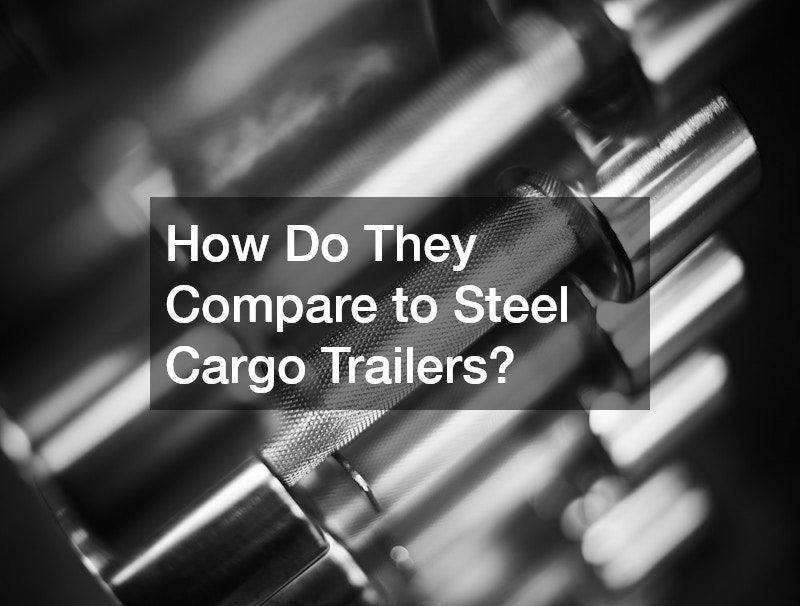What Are Cargo Aluminum Trailers Used For?


Cargo aluminum trailers have become increasingly popular in the modern transportation and logistics sectors. Their growing demand highlights their significance in efficiently moving goods across various industries.
This article delves into the many applications and benefits of cargo aluminum trailers. These trailers are known for their durability, fuel efficiency, and customization possibilities.
Understanding their applications helps businesses make informed decisions when investing in transportation solutions. Their versatility is matched by few other options available today.
How Durable Are Cargo Aluminum Trailers?
Material Advantages
Aluminum is a strong, lightweight material that offers substantial benefits in trailer construction. It provides a balance of strength and flexibility, essential for hauling various goods safely.
The inherent corrosion resistance of aluminum ensures these trailers maintain structural integrity over time. This quality is particularly beneficial for trailers exposed to harsh weather conditions.
Aluminum’s recyclability also means that once a trailer reaches the end of its life, the material can be repurposed, contributing to environmentally conscious transport solutions. This trait underlines its growing preference in the logistics industry.
Longevity and Maintenance
The lifespan of cargo aluminum trailers is markedly long due to their construction materials. With proper care, these trailers withstand the wear and tear of frequent use far better than many alternatives.
Regular maintenance, such as checking for loose fittings and ensuring protective coatings are intact, extends their operational life. Preventative measures help maintain performance and aesthetics over the years.
Routine cleaning and timely repairs further enhance their lifespan, providing cost-effective transportation over the trailer’s lifetime. For businesses, this translates into better returns on investment and reliable service.
What Types of Goods Can Be Transported?
Commercial Goods
Cargo aluminum trailers are adept at transporting an extensive range of commercial goods. They are commonly used for moving everything from electronics to packaged foods.
The trailers’ design facilitates easy loading and unloading, crucial for businesses focused on efficiency. They enable smoother operations in industries that depend on time-sensitive delivery schedules.
Additionally, their ability to withstand heavy loads without compromising structural stability is key for businesses relying on them for commercial haulage. This reliability enhances their appeal across sectors.
Specialized Transport Needs
Specialized aluminum trailers exist for industries like agriculture and construction, where specific transport requirements must be met. These trailers often come with custom features tailored to particular cargo needs.
For example, agricultural products might require temperature-controlled environments or particular spacing arrangements. Aluminum trailers can be outfitted accordingly to ensure product integrity during transit.
Similarly, construction materials that are bulky or uniquely shaped are frequently transported using trailers designed precisely for those forms. This customization ensures safe and effective transport across various specialized needs.
Are Cargo Aluminum Trailers Fuel-Efficient?
Weight Benefits
The lightweight nature of aluminum is a significant factor in fuel efficiency. Compared to heavier materials, these trailers offer more load-bearing capacity without excessive weight.
This characteristic leads to reduced fuel consumption, offering financial benefits to businesses through lower operational costs. Fuel efficiency is an increasingly important factor for eco-conscious companies.
Moreover, the fuel savings compound with frequent use, making these trailers a sustainable choice for logistics companies. Reduced emissions further enhance their appeal to environmentally responsible businesses.
Cost Savings
The operational cost savings associated with aluminum trailers are substantial. Their fuel efficiency directly translates into lower transportation costs over time.
These savings allow companies to allocate resources more effectively across other business areas. The result is a stronger financial position and increased competitive advantage.
In sum, the lightweight yet strong construction of aluminum trailers proves financially advantageous for businesses committed to efficient, sustainable operations. Long-term savings reinforce their position as a preferred choice in logistics.
What Are the Customization Options Available?
Design and Size Variations
Cargo aluminum trailers come in various sizes and designs to accommodate different transport requirements. Businesses can select dimensions that best match their specific operational needs.
Options range from small utility trailers for light-duty tasks to larger models for extensive freight loads. This versatility enables effective solutions for a broad spectrum of transportation demands.
Moreover, various modular designs allow for quick adaptations to changing transport needs, enhancing operational flexibility. Businesses gain from having trailers that evolve with their logistical challenges.
Modifications for Specific Uses
Custom features and enhancements can be added to aluminum trailers to cater to specialized transportation requirements. This adaptability is one of their standout benefits.
For instance, trailers can be equipped with specialized racks, refrigeration units, or other modifications according to cargo needs. Such adaptability ensures a tailored approach to logistics challenges.
Ultimately, these modifications enable businesses to optimize their transport operations, cutting costs while meeting or exceeding customer expectations. It is a valuable option for companies needing precise logistics solutions.
How Do They Compare to Steel Cargo Trailers?
Pros and Cons
When comparing aluminum and steel trailers, each material offers different advantages. Aluminum is lighter, offering better fuel efficiency and reduced strain on hauling vehicles.
Conversely, steel trailers are typically more robust, providing better protection against impact damage. The choice often depends on the specific transportation needs of the business.
However, aluminum’s resistance to corrosion and lighter weight often leads to cost savings in maintenance and operational aspects. This balancing act is crucial in deciding which type to use.
Use Cases for Each Type
Aluminum trailers are generally preferred in situations that prioritize fuel efficiency and long-term cost savings. Their versatility and adaptability make them suitable for many industries.
Steel trailers, however, are favored in situations that demand high durability and protection. These scenarios include environments with rough conditions or heavy-duty transport tasks.
Companies must evaluate their specific needs, considering factors like cargo type, travel distance, and budget. Both trailer types have unique merits suited for diverse logistical demands.
.



